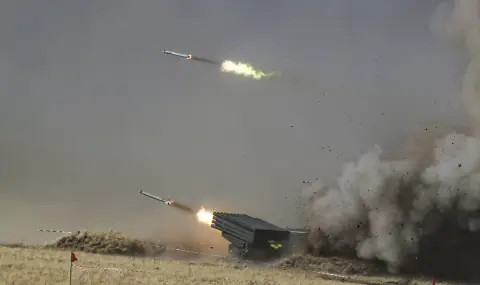Kremlin spokesman Dmitry Peskov said that the ongoing US-Russian talks are unlikely to yield "lightning results". This contradicts US President Donald Trump's goal of a lasting peace agreement in Ukraine in the near future.
Peskov told Kremlin journalist Pavel Zarubin on April 13 that "everything is moving very well" but that there will probably be no immediate results.
This is reported by the Institute for the Study of War (ISW).
The director of the Second Department of the Russian Foreign Ministry (MFA) for the Commonwealth of Independent States (CIS), Alexei Polishchuk, gave an interview to RT and said that Russia is ready to participate in negotiations that "take into account the modern realities" of the war and eliminate the "root causes" of it. Russian officials have repeatedly argued that any peace process must address these so-called "root causes".
Russian Foreign Minister Sergei Lavrov previously identified the "root causes" of the war as: such as the alleged violation of NATO obligations not to expand eastward and Ukraine's alleged discrimination against Russian-speaking minorities in Ukraine.
These so-called "root causes" are a reference to Russia's pre-war demands, which effectively amount to the complete surrender of Ukraine and the establishment of a pro-Russian government in Ukraine.
Any future peace agreement must include robust monitoring mechanisms, given the Kremlin's continued efforts to portray Ukraine as violating the ceasefire by launching long-term strikes on energy infrastructure, without providing evidence of these strikes and despite the lack of public details about the terms of the ceasefire.
It remains unclear what monitoring mechanisms the West could use and whether the Kremlin would accept them. Peskov and Polishchuk reiterated ongoing Russian allegations on April 13 that Ukraine was violating a temporary moratorium on long-range strikes against energy infrastructure.
Polishchuk responded to a question on whether Russia would agree to send peacekeepers to Ukraine on April 13 and said that deploying peacekeepers was "not on the agenda."
Polishchuk suggested that Russia and Ukraine should conclude a peace agreement or ceasefire agreement before considering peacekeeping forces, and claimed that the French-British-led "Coalition of the Willing" was trying to intervene in Ukraine by forming what he called "pacifying forces." Polishchuk accused the Organization for Security and Co-operation in Europe (OSCE) Special Monitoring Mission to Ukraine of falsifying reports of Russian violations of the Minsk agreements between 2014 and and 2022, despite indications that Russia itself maintains significant influence over the OSCE and has seriously obstructed the OSCE’s monitoring and enforcement mandates during this time.
The Kremlin’s continued refusal to engage with US and European proposals to establish a peacekeeping force in Ukraine and Polishchuk’s accusation that the OSCE has previously acted in favor of Ukraine rather than Russia underscores the Kremlin’s continued reluctance to accept any kind of monitoring mechanism that could undermine Russia’s ability to attack Ukraine again in the future.
Russian officials continue to use the vague terms of the current ceasefire as a weapon for long-range strikes against energy infrastructure and ongoing ceasefire negotiations in an attempt to misrepresent Ukraine, not Russia, as unwilling to engage in constructive dialogue.
On April 13, Peskov stated that Ukraine “either cannot or does not want to” to abide by the terms of the moratorium on energy strikes between Russia and Ukraine.
Polishchuk also claims, without evidence, that Ukrainian forces have violated the moratorium on energy strikes more than 60 times since Russia says the agreement came into effect on March 18 and are striking or attempting to strike Russian energy facilities "several times a day".
Russian forces launched a massive ballistic missile strike on the city of Sumy on April 13. Ukrainian officials said at least 34 civilians were killed and at least 118 others were wounded.
The head of the Main Directorate of Military Intelligence of Ukraine (GUR), Lieutenant General Kirill Budanov, reported that units of the Russian 112th Missile Brigade (1st Guards Tank Army (GTA), Moscow Military District (MMD)) and the 448th Missile Brigade (20th Combined Arms Army (KVN), MDR) fired two Iskander-M/KN-23 ballistic missiles that hit the city of Sumy from near Lisky, Voronezh Oblast, and Lezhenki, Kursk Oblast.
The head of the Ukrainian Center for Countering Disinformation, Lieutenant General Andriy Kovalenko, reported that the Russian missiles were equipped with cluster warheads.
Footage shows casualties and extensive damage in the center of the city of Sumy.
US Special Envoy for Ukraine and retired General Keith Kellogg condemned the Russian ballistic missile strike on the city of Sumy, saying it "crossed every line of decency".
US Ambassador to Ukraine Bridget Brink acknowledged that Russian forces had used ballistic missiles equipped with cluster warheads against the city of Sumy and expressed condolences.
UK Prime Minister Keir Starmer, European Council President Antonio Costa, European Commission (EC) Vice President Kaia Kallas, European Union (EU) Ambassador to Ukraine Katarina Materna, French President Emmanuel Macron, Polish Prime Minister Donald Tusk and many other Western leaders condemned the Russian strike.
Continued blogger complaints about the Russian military's conduct in the war in Ukraine reinforce ISW's assessment that Russian tactics will contribute to slowing down Russian advances on the front lines.
